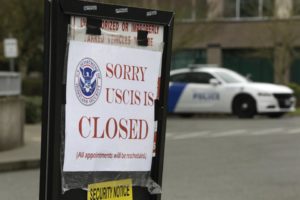 Without a doubt, COVID-19 has had a disruptive effect on almost every aspect of our lives. The extraordinary and unprecedented public health emergency COVID-19 created has caused different businesses and government agencies to unexpectedly shutter their operations in order to minimize the spread of this virus. One unintended consequence is that COVID-19 has forced U.S. Citizenship and Immigration Service (USCIS) processing of cases to come to a virtual standstill. As a result, the production of certain Employment Authorization Documents (Form I-766, EAD), among other things, has been delayed. Because failure to receive an EAD document can result in a foreign national not being able to continue to work (and ultimately) a termination, a lawsuit has been brought against USCIS in the U.S. District Court for the Southern District of Ohio (Easter Division) challenging the delay in issuance of the employment authorization document (EAD) following approval of the I-765 application.
Without a doubt, COVID-19 has had a disruptive effect on almost every aspect of our lives. The extraordinary and unprecedented public health emergency COVID-19 created has caused different businesses and government agencies to unexpectedly shutter their operations in order to minimize the spread of this virus. One unintended consequence is that COVID-19 has forced U.S. Citizenship and Immigration Service (USCIS) processing of cases to come to a virtual standstill. As a result, the production of certain Employment Authorization Documents (Form I-766, EAD), among other things, has been delayed. Because failure to receive an EAD document can result in a foreign national not being able to continue to work (and ultimately) a termination, a lawsuit has been brought against USCIS in the U.S. District Court for the Southern District of Ohio (Easter Division) challenging the delay in issuance of the employment authorization document (EAD) following approval of the I-765 application.
Today, USCIS announced that employees may use Form I-797, Notice of Action, with a Notice date on or after December 1, 2019 through and including August 20, 2020 informing an applicant of approval of an Application for Employment Authorization (Form I-765) as a Form I-9, Employment Eligibility Verification, List C #7 document to establish employment authorization issued by the Department of Homeland Security pursuant to 8 C.F.R. 274a.2(b)(1)(v)(C)(7), even though the Notice states it is not evidence of employment authorization. This newly created exception to the Form I-9 rules will expire on December 1, 2020. Additionally, please note that employees will still be required to present a List B document to establish their identity. Continue reading “USCIS permits use of approval notices as evidence of work authorization due to COVID-19 delays”

 The Trump administration is about to achieve what many see as its long-held objective of bringing the U.S. legal immigration system to a halt. While the administration would not be allowed to stop processing immigration applications without incurring legal action, critics say that through policy choices and mismanagement of U.S. Citizenship and Immigration Services (USCIS) it may accomplish the same goal.
The Trump administration is about to achieve what many see as its long-held objective of bringing the U.S. legal immigration system to a halt. While the administration would not be allowed to stop processing immigration applications without incurring legal action, critics say that through policy choices and mismanagement of U.S. Citizenship and Immigration Services (USCIS) it may accomplish the same goal. A federal appellate court on Wednesday limited an order that had blocked the nationwide implementation of a controversial wealth test for green cards and immigrant visas, allowing the Trump administration to continue the policy in every state except New York, Connecticut and Vermont.
A federal appellate court on Wednesday limited an order that had blocked the nationwide implementation of a controversial wealth test for green cards and immigrant visas, allowing the Trump administration to continue the policy in every state except New York, Connecticut and Vermont. The Trump administration will increase fees on businesses, new citizens and international students who need work authorization. The new fee rule from U.S. Citizenship and Immigration Services (USCIS) is the latest Trump administration action to restrict immigration to the United States and make life more difficult for businesses seeking skilled workers and individuals who want to be American citizens.
The Trump administration will increase fees on businesses, new citizens and international students who need work authorization. The new fee rule from U.S. Citizenship and Immigration Services (USCIS) is the latest Trump administration action to restrict immigration to the United States and make life more difficult for businesses seeking skilled workers and individuals who want to be American citizens. Tens of thousands of undocumented immigrants who have been able to drive legally in Florida may be unable to get driver licenses again after the state quietly changed its identification requirements for obtaining licenses.
Tens of thousands of undocumented immigrants who have been able to drive legally in Florida may be unable to get driver licenses again after the state quietly changed its identification requirements for obtaining licenses.